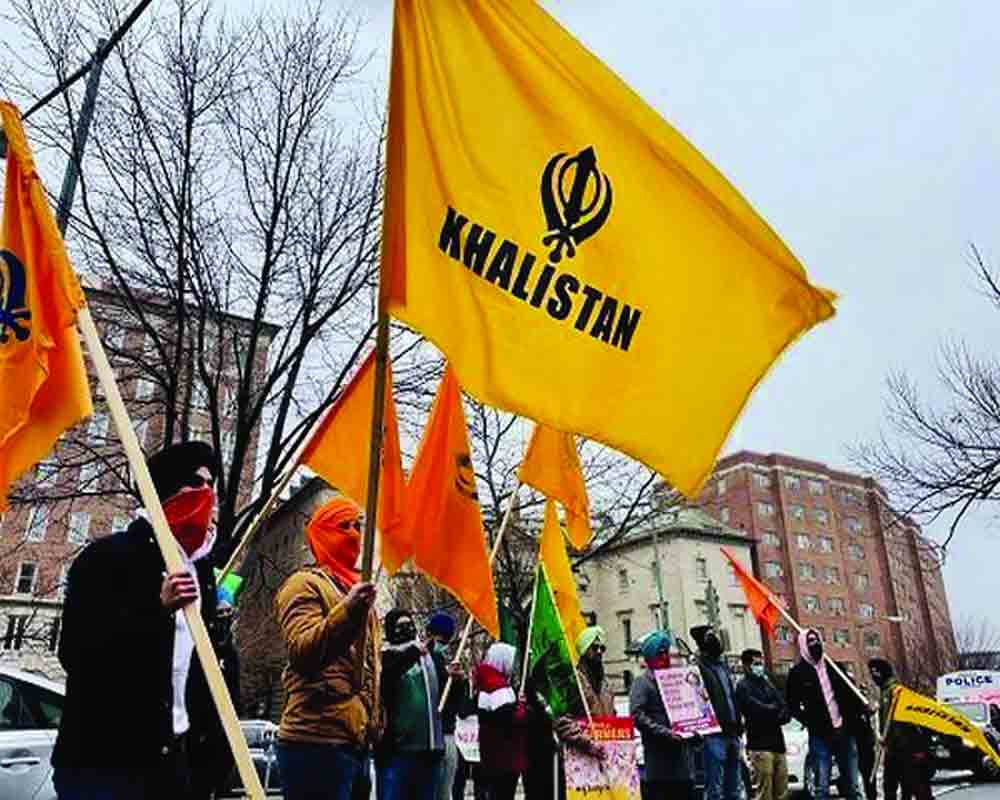Concerns have been made regarding the recent pro-Khalistani parade in Brampton, Canada, which included a tableau commemorating the killing of former Indian Prime Minister Indira Gandhi, and its influence on Indo-Canadian ties.

Glorifying Violence on the Offensive Float
- Indira Gandhi as depicted: The float included a tableau of a woman clad in a white sari, representing India’s former Prime Minister Indira Gandhi. The depiction of her in a bleeding state was intended to convey a sense of violence and savagery.
- Soldiers Practising Guns: In the scene, two soldiers were pointing their weapons at the painted figure of Indira Gandhi. This artwork delivers an aggressive and threatening message to a political authority.
- Board Text: Behind Indira Gandhi’s picture was a board that read “Revenge of attack on Shri Darbar Sahib.” This text conveys a desire for vengeance in response to the attack on the Golden Temple (Shri Darbar Sahib) and a justification for violence.
- “Never, ever forget 1984”: The float was emblazoned with the slogan “Never forget 1984.” This statement alludes to the anti-Sikh riots that occurred in 1984 in the aftermath of Indira Gandhi’s assassination, emphasising the celebration of a violent historical event.
External Affairs Minister of India’s Reaction:
- External Affairs Minister S. Jaishankar addressed the offensive float in a media briefing on June 8. While he did not explicitly address the incident, he did address the wider issue of Canada allowing separatists, extremists, and those inciting violence to exist. He emphasised that such a posture is harmful to India and Canada’s bilateral relationship.
- Condemning Hypocrisy: Jaishankar slammed Canada’s hypocritical stance on human rights issues, as well as its historical disdain for India’s territorial integrity. He emphasised the importance of Canada reevaluating its policies and taking into account the impact of its actions on the relationship between the two countries.
- Although Mr. Jaishankar spoke out against the provocative float and Canada’s permissive climate for separatists, it is significant that he did not specifically reference the former Prime Minister, Indira Gandhi.
- Canadian High Commissioner’s Statement: While Mr. Jaishankar did not name Indira Gandhi, Cameron Mackay, Canada’s High Commissioner to India, publicly condemned the event in a tweet. He was outraged by rumours of a Canadian celebration commemorating the assassination of the late Indian Prime Minister.
Concerns regarding violence’s glorification
- Glorification of Violence: Glorifying violence creates a culture of antagonism, division, and hatred. It has the potential to exacerbate tensions between different communities or groups, leading to additional disputes and hatred.
- Social cohesiveness Erosion: Glorifying violence destroys social cohesiveness and harmony within societies. It exacerbates complaints and fosters a climate susceptible to violence and social upheaval.
- Undermining the Rule of Law: Glorifying violence violates the principles of the rule of law and peaceful dispute settlement. It fosters a worldview that justifies resorting to violence to address concerns, ignoring established legal frameworks and peaceful dispute settlement methods.
- Impact on National Identity: Glorifying violence can ruin a nation’s image and identity. It promotes negative perceptions, perpetuates violent cycles, and can cause emotional suffering for individuals or communities touched by the events.
- Glorifying violence obstructs attempts towards peace and healing. It aggravates the wounds of previous conflicts, making it more difficult to create understanding and conversation across diverse groups or communities.
- Restricted International Relations: Glorifying violence can strain international relations, especially when it includes problematic historical events or political leaders. It can cause diplomatic conflicts, a breakdown in confidence, and a stifling of cooperation and collaboration across multiple areas.
What this means for Indo-Canadian relations
- Diplomatic Tensions: The incident has the potential to undermine India-Canada relations. The promotion of violence and the glorifying of a historical event that caused tremendous sorrow and turbulence in India might lead to a breakdown in trust and cooperation between the two countries.
- Insensitivity: If Canada is considered as failing to take necessary measures to address and condemn the glorification of violence, it may be perceived as insensitive to India’s concerns. This view has the potential to undermine mutual understanding and goodwill, both of which are required for effective bilateral partnerships.
- Glorification of violence can negatively impact people-to-people connections between India and Canada, deepening divisions and resentment, hindering social cohesion and understanding.
- Extreme tensions can have economic and trade consequences, affecting trade and investment flows, and hindering cultural exchanges and cooperation.
- This can discourage collaborations in areas like education, arts, tourism, and mutual understanding, limiting opportunities for mutual appreciation and growth.
Way forward
- Both India and Canada should engage in open dialogue, including government officials, diplomats, and civil society organizations, to address concerns, clarify misunderstandings, and find common ground for cooperation. They should condemn violence and promote a culture of non-violence through clear statements from officials and community leaders.
- Encouraging cultural exchanges and understanding can enhance understanding between nations by showcasing cultural diversity and promoting shared values. Enhanced cooperation in fields like trade, investment, technology, and research can strengthen bilateral relationships through collaborative projects, joint initiatives, and mutually beneficial partnerships.
- Promoting mutual respect and sovereignty in bilateral relations is essential. Both countries should respect each other’s historical narratives and concerns while resolving differences peacefully. Canada should engage with the Indian diaspora, including Sikhs, to build bridges and promote understanding of India’s diverse perspectives.
@the end
Brampton parade emphasizes Canada’s hypocritical stance on separatism and violence, while India’s diaspora engagement requires sensitive engagement and respect for sovereignty.
Source: https://indianexpress.com/article/explained/explained-politics/khalistan-sikh-diaspora-canada-8652854/
